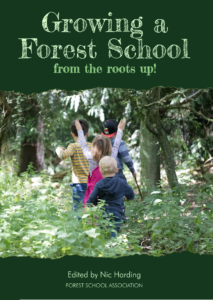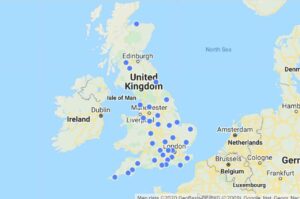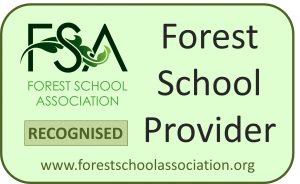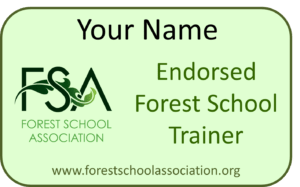Hi there,
I hope you are well and enjoying some autumnal walks. I’m in the process of updating key supporters about the Nature Premium campaign.
The exciting news is that we have had some real success in the last week or so. It all started last Friday 18th September.
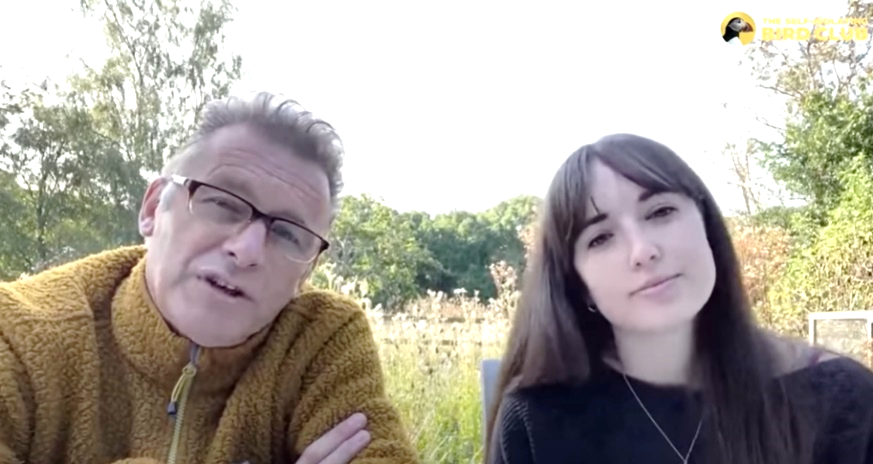
Chris Packham and Megan McCubbin promoted our campaign during their Self Isolating Bird Watching Club (SIBWC) broadcast https://youtu.be/c_bcZ9T_Eg8?t=2360 We were bowled over with their support. Chris made some excellent points about the inequity of access to nature and the need for diversity. The Nature Premium would support all children. The SIBWC Facebook page has 44.0K supporters. Over the weekend more than 1000 signatures were added to the petition and the Facebook post has been viewed 12,000 times.
Also on Friday 18th, Sharon Friend (FSA member), met with George Eustice her constituency MP.
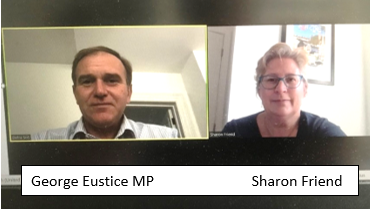
Sharon teaches at Cornwall College, is an expert in early years and Forest School and is in the middle of a PhD on the benefit of risk to children. She has a 7 year old and a 9 year old and was able to tell George Eustice how the children are spending their time at school. Her daughter has a pedometer on her watch, it has demonstrated that she takes fewer steps at school this term than during lockdown when she was confined to the house. During a useful discussion Sharon talked about the value of outdoor education, the current situation in schools, the campaign proposal, short, medium and long term benefits, and the priorities as stated in A Green Future: Our 25 Year Plan to Improve the Environment to connect children with nature. Most importantly Sharon talked about the disconnect between the promotion of the benefits of nature for children by DEFRA, Natural England and mental health charities and the lack of engagement from the Department for Education.
George Eustice committed to:
- Look at the Nature Premium website
- Find the letter sent to him by the campaign.
- Speak to Gavin Williamson and Nick Gibb about the Nature Premium proposal and find out what evidence they would need to enable them to accept the benefit of time spent in nature for children’s wellbeing and learning.
- He suggested a small trial.
We would like to thank Sharon for making such a good case to George Eustice, we think she played a ‘blinder’.
Sharon then followed up her meeting with an email to George Eustice. Rather than suggest a trial we propose that the campaign organises a meeting with the Department for Education to find out what information they need. We would like to invite industry experts and academics to answer any questions. We firmly believe that the need is urgent, and the evidence already exists. The desperate need of children calls for the Department for Education to listen to the proposal and make evidence informed decisions to benefit all children rather than a lucky few.
The third piece of news is that Harriet Barber from the Telegraph interviewed Sara Collins and Sarah Lawful (from the campaign) about the Nature Premium campaign. She has had a feature article commissioned but the editors wanted to lead with the benefit of Forest School during lockdown. Time will tell if the Nature Premium is included.
Interestingly the Department for Education responded almost immediately to Harriet. She then asked us what the Nature Premium would provide that the 25 year environment plan doesn’t? How would we respond to the idea that some of these activities are happening organically anyway? Our response was that Ofsted requires schools to act with ‘intent’ and outdoor nature activities that happened organically was not good enough. Because of the urgency of the situation we asked the Department for Education to act with ‘intent’ and remove the inequity of access to nature for the benefit of all children.
On Wednesday the 23rd September the Nature Premium campaign was included in the Harmony in Education webinar attended by over 250 people including Professor Joy Carter, the Vice Chancellor of Winchester University (the university for sustainability and social justice), Sir Anthony Seldon (Vice-Chancellor of The University of Buckingham since 2015, he is one of Britain’s leading contemporary historians, educationalists, commentators and political authors) and Tim Smit of The Eden Project. We really appreciate the support that Richard Dunne is giving to the project.
You can read and hear more here.
| Harmony in Education webinar https://vimeo.com/user118798134 – It’s a very interesting presentation, but the Nature Premium is mentioned @ 18 minutes 40 seconds. |
| The Forest School Podcast https://children-of-the-forest.com/tfsp (05/09/2020) |
| The Harmony Project Podcast with Sarah Lawfull (https://www.theharmonyproject.org.uk/a-harmony-project-podcast-with-sarah-lawfull/ ) |
| The Wildlife and Countryside Link blog – A Nature Premium would help children recover from lockdown and set them up to learn (https://www.wcl.org.uk/a-nature-premium.asp ) |
| Early Childhood Outdoors blog – Children need nature now. (https://www.earlychildhoodoutdoors.org/children-need-nature-now/ ). |
I have linked Professor Sir John Lawton’s open letter – Making Space for Nature – 10 years on (16/09/2020) to Boris Johnson. It is a timely statement of the Government-commissioned review of England’s ecological network, Making Space for Nature.
I think the last points he makes are particularly powerful.
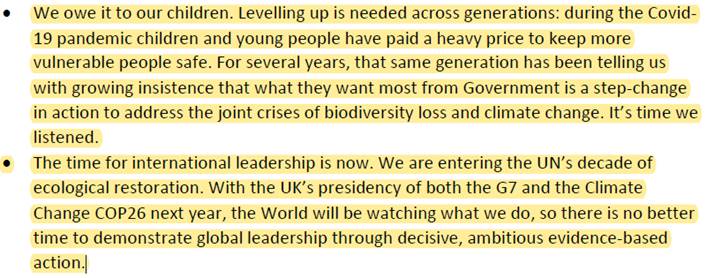
Sir John has agreed to support the campaign as we are on the ‘same page’.
We feel as though our growing mycelium of emails, e-meetings and letters is starting to produce some fruiting bodies.
I’ll let you know as things develop. In the meantime it would be great if you could share our news with your network or speak to your MP about the campaign. I have copied our letter to Gavin Williamson below as it has the full proposal. Please shout if you have any questions or need help.
Best wishes Sara
Dr Sara A Collins
Nature Premium campaign coordinator
Tel: 07581 484892
Sara A Collins
Deputy Chair
Director responsible for Marketing
Forest School Association
c/o Institute for Outdoor Learning,
Warwick Mill Business Centre,
Warwick Bridge,
Carlisle,
Cumbria, CA4 8RR
Telephone: 01228564407
01/08/2020
Mr Gavin Williamson MP
Secretary of State for Education
We are calling for a Nature Premium to fund regular nature experiences for every child.
#NaturePremium
Dear Mr Williamson,
We believe that the Nature Premium will address children’s mental health, physical well-being and behaviour decline problems in education resulting from COVID-19. Research from Natural England and academics has demonstrated that time in nature:
- improves children’s mental and physical well-being.
- results in happier and healthier children.
- builds resilience and sets the children up ready to learn.
- actively engages the next generation to build nature-centric communities.
The Nature Premium, using the Sports Premium model, will engage children and young people in protecting and promoting biodiversity, supporting the development of the UK’s natural capital for future economic gain.
Please make the evidence-informed decision to invest in the Nature Premium for early years and school children.
Whilst this campaign is designed to benefit all children and young people, making them happier and healthier, there are many additional benefits for other stakeholders. Learning outside in nature will help schools and teachers, adding value to the work of conservation, play and health charities and, promote outdoor education. The knock-on effect will be better care for our countryside, for our world environment and lay the foundations for future Green Industries.
This campaign is independent of any organisation but is underwritten by the Forest School Association, it is managed by volunteers who have seen how children benefit from playing in nature.
‘We believe that the Nature Premium would improve children’s mental and physical well-being after lockdown and demonstrate a positive investment in their future development as part of the Green Recovery’.
Lily Horseman, Chair of the Forest School Association
Please look at the short, medium and long term gains
The government should invest in a Nature Premium for children (using a similar model as the Schools Sports Premium – which funds regular PE sessions for all children – annual cost = £320million).
1. For the short-term gains of:
o Supporting teaching outside to reduce the risk of COVID-19 infection.
o Improvement of children’s mental wellbeing outcomes – saving short-term cost of mental health interventions that have developed during lockdown.
o Encouraging higher levels of physical activity, addressing obesity levels that developed during lockdown.
o Building vitamin D levels and children’s immune systems, to help fight viruses.
o Reconnecting children and staff to nature, reducing stress levels.
o Reconnecting over 4,727,090 children to nature; children’s experience with nature is varied, with almost 25% spending time outside less than once a month.
o Benefiting ethnic minority children (33% average in primary schools), improving their health and encouraging diversity in countryside experiences.
o The likely return of investment. OECD research shows that investment in early years/ primary age has a greater return than in secondary education.
o Helping children manage their own safety, understand the importance of hygiene, prevent cross-contamination and play within their coronavirus safety bubble.
o Enabling schools to bring in Forest School / Outdoor Learning experts who can facilitate nature connection/contact. The expertise exists in the outdoor education and conservation industry.
o Enabling good quality Outdoor Learning to start immediately rather than putting pressure on teachers to go through additional training. This is an immediate solution to the staff capacity problem.
o It is in line with Natural England and Defra research and policies.
o It is in line with the Chief Medical Officer’s statements and medical research.
2. For the medium-term gains of:
o Enabling Head Teachers to support Outdoor Learning and all its benefits avoiding difficult either/or decisions because of limited resources.
o Providing opportunities to access existing local outdoor learning provision and residential courses.
o The improvement of vulnerable children’s mental wellbeing outcomes – reducing the investment required for existing mental health conditions.
o Encouraging higher levels of physical activity, addressing obesity levels that are the result of deprivation and lifestyle.
o Fulfilling a curriculum requirement from the Ofsted framework to create an enriched curriculum.
o Improving levels of children’s creativity; a PISA criterium for 2021-22.
o Compatibility with the government publication A Green Future: Our 25 Year Plan to Improve the Environment.
o Compatibility with Natural England and Defra research and policies.
3. For the long-term gains of:
o Building children’s understanding of how they fit into the British countryside.
o Building children’s knowledge of environmental issues and how they can care for their local community and the planet.
o Building the knowledge base of educators and children around biodiversity and the management of nature rich school grounds.
o Building a generation that can develop the economic value of the UK wildlife and countryside.
o Preparing students to study the new GCSE in Natural History.
o Preparing a generation that will want to contribute to the National Nature Service.
o Preparing a generation that wants to work in green industries in the environmental sector.
o Showing commitment to the UN Sustainable Development goals.
o Setting a gold standard for education at an international level.
I have enclosed the Reasons to be Outside booklet for your reference and a coaster for your desk.
If you turn the coaster over, you will see a great example of the growth rings of the tree. If you are tempted to count the rings you will see that it would have started to grow during the build up to John Major’s resignation and re-election in 1995. You will also notice that the distance between the rings (indicating one year’s growth) changes from the centre to the edge of the disc, showing that the growth slows after the first 10 years. This could be related to a change in weather or maybe something reduced the trees access to sunlight. The bark looks to me to be Sweet Chestnut bark, these trees were introduced by the Romans and provide the chestnuts we eat at Christmas (can you hear Bing Crosby singing in your mind’s ear?). Sweet Chestnuts are surprisingly rich in Vitamin C which would have helped keep the Roman soldiers healthy during their winter campaigns. Vitamin C helps prevent Scurvy and is necessary for the growth, development and repair of all body tissues and the function the immune system. The Sweet Chestnut flowers provide an important source of nectar and pollen for bees and other insects, squirrels eat the nuts and a large number of micro-moths feed on both the leaves and nuts. I have included this information so that you can see the sort of learning that can be generated from a slice of wood. Imagine the sort of conversations that you could have standing in the rich environment of a forest.
Thank you for taking the time to read this letter. I look forward to your response to the Nature Premium proposal.
Yours hopefully,
Dr Sara Collins
Campaign Co-ordinator and the Nature Premium campaign team.
For more information please take a look at our website www.NaturePremium.org.
Notes:
- Children’s experience with nature is varied, with almost 25% spending time outside less than once a month.
- Time spent in the natural world provides large benefits to the economy.
- The government invested £6.4 million over 4 years in 300 Nature Friendly Schools in 2019. This is the equivalent to £5,333.33 per school per year. There are 16,769 state funded primary schools in England.
- The government funds the Sports Premium so that the average state funded primary school receives £18,660 per year.
- In 2018 the government published A Green Future: Our 25 Year Plan to Improve the Environment. In Chapter 3: Connecting people with the environment to improve health and wellbeing it states ‘we will Encourage children to be close to nature, in and out of school, with particular focus on disadvantaged areas. It goes on to say this will be achieved by i. Helping primary schools create nature-friendly grounds ii. Supporting more pupil contact with local natural spaces (page 75 -76)

